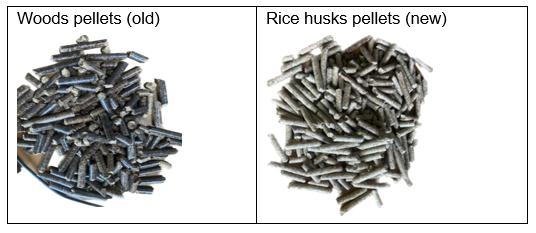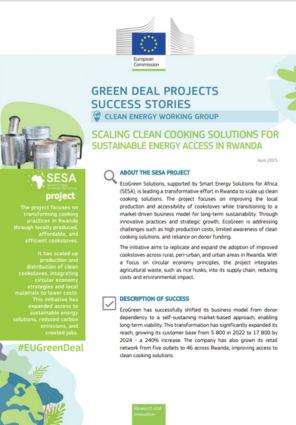About the project
SESA is a collaboration between the European Union and nine African countries (Ghana, Kenya, Malawi, Morocco, Namibia, Nigeria, Rwanda, South Africa and Tanzania). It aims to accelerate the green transition and energy access in Africa through co-developing technologies and business models that can be easily replicated, fostering local economic development and enhancing social cohesion in Africa. With an emphasis on collaborating with local in-country partners, SESA explores a wide range of solutions, from solar systems and waste-to-energy, to rural internet access.
Description of success
SESA put out a call for entrepreneurs in Rwanda with the ambition of replicating and scaling up an innovative business model for improved cook stoves. Through this call, the project is supporting EcoGreen Solutions Ltd, a Rwandan company privately owned by two women who are passionate about clean and sustainable cooking solutions. The company focuses on improving the local production and accessibility of cookstoves and raising awareness of clean cooking alternatives. The initiative aims to replicate and expand the adoption of improved cookstoves across rural, peri-urban, and urban areas, empowering and enriching the lives and welfare of local families and communities.
SESA has been supporting EcoGreen Solutions to successfully shift its business model from donor dependency to a self-sustaining market-based approach, enabling long-term viability. This transformation has significantly expanded its reach, growing its customer base from 5,800 in 2022 to 17,800 by 2024 - a 240% increase. The company has also grown its retail network from five outlets to 46 across Rwanda, improving access to clean cooking solutions.
To make cookstoves more affordable, EcoGreen Solutions streamlined its supply chain and introduced local materials, such as clay burning chambers to replace stainless steel stoves, reducing costs from EUR 51 per stove to as low as EUR 10. This innovation has made cookstoves more accessible to low-income households, while also facilitating production and scalability.

Figure 1: Clay stove (left) making economic savings compared to the stainless steel stove (right)

Figure 2: SESA supported EcoGreen Solutions in transitioning to locally sourced rice husk pellets as biomass fuel, rather than wood pellets.
EcoGreen Solutions’ efforts have led to the creation of 67 new jobs, with women comprising 58% of the workforce, and an additional 301 indirect jobs. Since September 2023, EcoGreen Solutions has produced 14,326 stoves and sold 13,019 units, making a significant impact on clean energy adoption and reducing reliance on traditional cooking methods.
Highlights
Transitioned from a donor-dependent model to a market-based business approach for financial sustainability.
Expanded production and distribution, achieving a network of 46 outlets and reaching 17,800 customers by 2024.
Developed and tested seven new affordable stoves, certified by the Rwanda Standards Board.
Reduced stove production costs using locally sourced materials, such as clay burning chambers.
Created 67 direct jobs and 301 indirect jobs, empowering women and local communities.
Outputs
Increase in local manufacturing of cookstoves: Distributed additional 10,478 stoves and 580MT of pellets.
Developed 7 different cookstove types, suitable for different consumer segments (rural, peri-urban, urban) which have been certified by the Standard Board of Rwanda.
Expansion of business across Rwanda: Opened 41 outlets for increased accessibility from 5
Growing market presence: Developed new customer segments in urban, peri-urban, and rural areas from humanitarian settings only.
Impact
EcoGreen Solutions’ initiatives, supported by SESA, have significantly improved energy access and environmental sustainability in Rwanda. The adoption of clean cookstoves has reduced deforestation and carbon emissions while improving indoor air quality, leading to better health outcomes for families. The project has successfully taken a market-driven approach and integrated local resources to build resilience and financial sustainability for clean cooking solutions. It has also supported local economies through job creation, and skill development.
Lessons
To enhance a company’s profitability and sustainability, focus should be placed on the effective management of direct costs by optimising the supply chain, prioritising local production, and exploring circular economy practices.
Diversifying the customer base is essential to minimise risks and withstand intense competitive pressure. Therefore, the product should be fit to meet the unique needs of different consumer segments (rural, peri-urban, and urban).
Other information
Find out more about EcoGreen Solutions on their website, including customer testimonials that describe their improved health symptoms since using an EcoGreen Solutions stove.
Learn more about how SESA has been supporting EcoGreen Solutions on its website.

